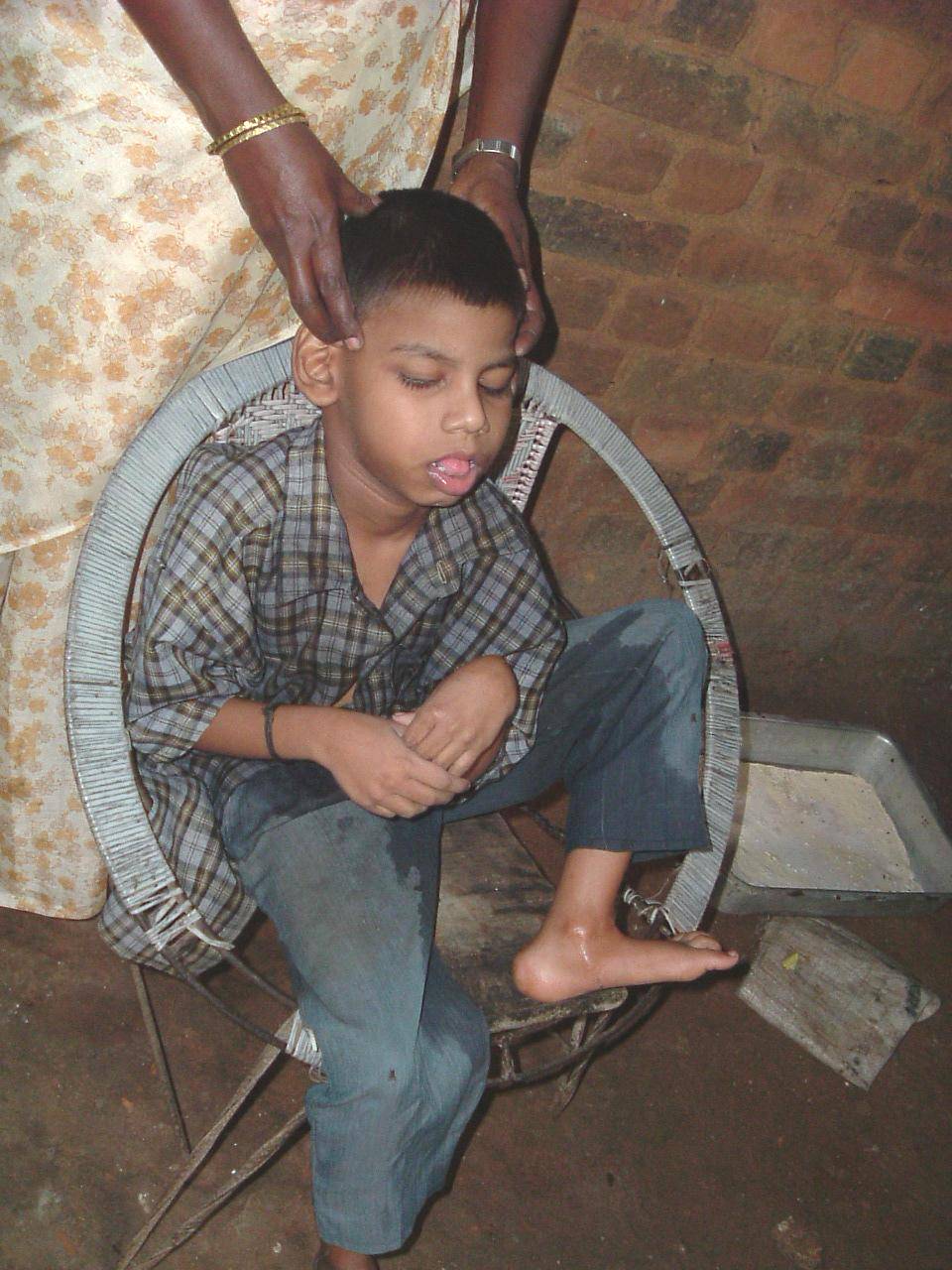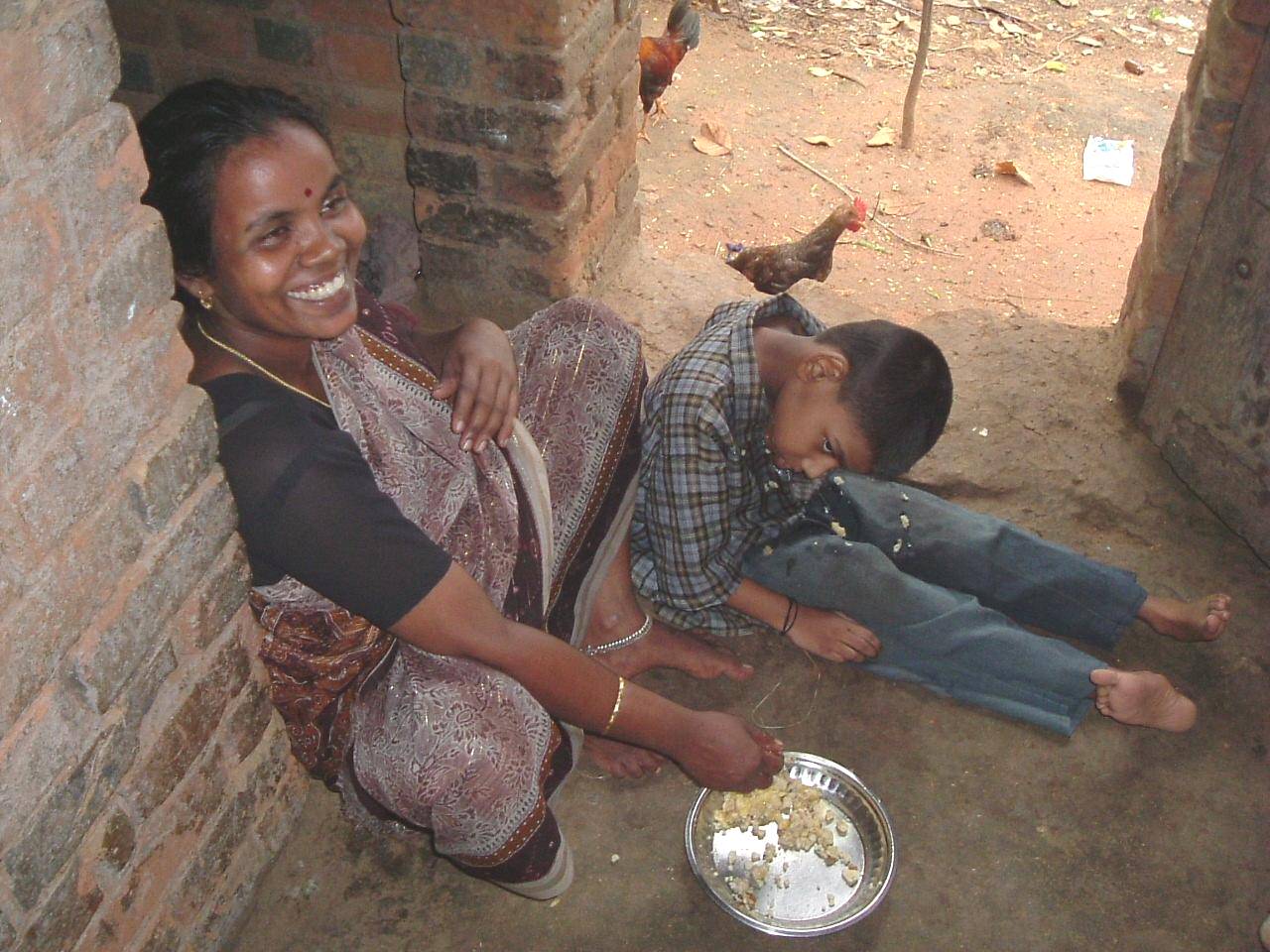
"News with equal focus on each person"
| 12 August 2005 | Archive | Subscribe for free by E-mail
or |
|
Low In IQ, High In LoveBy F. Merlin Flower Sajin in his home.
Sajin can now move his legs and do a wobbly walk, responding to sounds and commands. To communicate, he has created his own set of sounds and signs, deciphered only by his parents and little sister. Sajin laughs loudly at jokes, brightening his mother Ambika's face. He opens his mouth wide as she feeds him a banana. Ambika could have never guessed, two years ago, that this transformation was possible in a child dubbed mentally retarded, and who could hardly move his legs. Everything changed with the arrival of Mariapuspam, a trained physiotherapist working with a non-governmental organization called Brindavan, a federation of organisations working for the disabled. When she arrived at the door of Sajin's family home in Chennai (formerly Madras), India, two years ago, when Sajin was seven, "His legs were very stiff and felt like an iron rod," she remembers. She said that the changes would have been hard and slow but for the cooperation of Sajin's parents. His father, Russel Das, helped Sajin to his feet, quickly learning the exercises taught by Mariapuspam. But many of the parents of mentally disabled children aren't like Ambika and Russel Das, says Mariapuspam. She adds that there had been instances where the parents would never permit her near a mentally challenged child. "What's more, they don't allow even the other siblings of the affected child near him or her". Most of these parents, it seems, accept their child's condition as a punishment from God, and treat the child as a punishment or a burden to carry. Hence the child is isolated and given a separate place, spending most of the time sleeping. Mentally challenged children have an intelligence quotient (IQ) below 70-75. They are highly prone to physical illness and tend to be slightly shorter and walk or talk only with proper training. These children, being slow learners, find it hard to adapt themselves to the hard-core world outside. The direct consequence of this is their need to have special training to enhance their poor motor and language skills. Hence, Mariapuspam is happy to spot very young mentally challenged children. "The younger the child, the better are the chances of it talking and walking early," she says. "Vocational training can be imparted to these children easily, reducing their financial dependence on others," she added. There are many reasons for a child to be born mentally challenged. Sajin had a normal birth but had a deep wound in his head, caused by the doctor's instrument. "If the doctor is careless, and lifts the child roughly, as in Sajin's case, the child could be mentally retarded," says Dr. Mahesh Bhoopati of the state Government Hospital, Aasaripallam. There are other reasons too. If the placenta separates from the uterine wall before birth, or if the umbilical cord wraps tightly around the neck, the child may suffer insufficient oxygen supply to the head, which could lead to permanent brain damage. If the mother drinks alcohol or has had Rubella during pregnancy, the chances of a mentally challenged child are increased. Iodine deficiency during pregnancy can also lead to mental retardation. "In some cases, the retardation is noticeable only after a year," says Bhoopati. This is true in the case of Ajitha, who is now 30 years old. "She was a normal and beautiful child," says her mother Ambili, "but after a year or so, we began to feel the difference. She didn't respond to sounds and lacked the vitality of a young child." Unlike Sajin, Ajitha can walk normally and didn't need any special training to do so. It was Ajitha's mother who gave the other training she needed. Today Ajitha does all her housework and can speak well too. Ambili is not "unhappy," as she put it, to have Ajitha as her daughter. Ambili is an exception, as many parents feel it a shame or a stigma to have a mentally challenged child at home. Ambili's neighbours too are supportive and stand by her. The only thought which haunts Ambili is the future of Ajitha. Ambika's husband is dead, and the family is supported by Ajitha's brother. (Continued on next column) |
(Continued from previous column)  Sajin and his mother Ambika
On medication for the past 27 years, Ajitha used to have frequent attacks of epilepsy too. "This can happen in mentally challenged children," says Dr. Bhoopati. But then, there have been marked differences in the last two years, according to Ambili. Now, medicines have controlled the epileptic attacks, but even if one tablet is missed, Ajitha gets seizures. Ajitha was very fat two years ago. But her mother is not worried seeing the sudden reduction in the weight of her daughter and believes that medicines can one day cure her child. However, Dr. Bhoopati disagrees. He says that it is only possible to reduce the symptoms of the disease as it is only "treatable and not curable." Appi Amma has four children. Two are mentally retarded, and one has mental illness. She spends much money on medicines and time in prayer. Her daughter with a mental illness was a normal house wife with two children. She had domestic problems and used to fight with her husband. Appi Amma doesn't remember noticing the changes in her daughter, but neighbors did, and now she is under medication. Omana too was a normal house wife until she was diagnosed with mental illness. A property clash with her neighbours led her to this illness, says her mother-in-law. Omana has three children, and after being under medication for a year, she does all the household chores but doesn't speak much. Did domestic violence cause the illness in both Omana and Appi Amma's daughter? No, says Dr. Bhoopati. "These are only the triggering Events, and medicines can only control the symptoms," he said. Mental illness comes under a broad spectrum which includes schizophrena, depressive disorder, bipolar disorder, obsessive-compulsive disorder, attention deficiency, excessive panic, etc. These illnesses normally affect people like Omana who are in the prime of their life, i.e., during adolescence and adulthood. Here, too, medications can be used only to control the symptoms of the diseases. Marapuspam's colleague Glory mentioned the case of a man called Laser, who was chained inside a toilet when she saw him for the first time. He had a plate before him for food, thick with grime. Here, it was the family subjected to counseling first. Then, Laser was given medicines, counseling, and training. Today he is the proud owner of a shop. All this in a brief span of three years. He still takes medicines but supports his family. Thankammal began to cook food for her late husband and to talk to herself all day long. Her daughter Sharadammal was in the hospital, down with a major operation and recovering with bed rest for six months. Thankammal was alone in the house and began to act strangely, save that she did all her housework. Her daughter was shocked to see the mother on her return. She felt that isolation had done the trick, and Thangammal was labeled "mental" and thought to be suffering mental illness. "But actually," says Dr. Bhoopati, "it's a case of dementia," as Thankammal is over 70 years old. Though old age is the major risk factor, dementia is not a normal part of the ageing process. Dementia is a disorder of the brain leading to a collection of symptoms like inability to solve simple problems, losing the normal emotional control, delusion and hallucination. In Thankammal's case, symptoms involved hallucination and slight impairment in intellectual function. Dementia is not a specific disease, but a collection of symptoms that can be caused by diseases such as Alzheimer's disease, vascular dementia, frontal temporal dementia, or Huntington's disease. Dr. Bhoopati says that loss of nerve cells in the brain had caused Thankammal's strange behavior. Here, too, medicine can only help in reducing the symptoms. Most dementia progresses, becoming gradually more severe over a span of several years. In the advanced stages, a person with dementia needs special care, as the person could harm herself and others. Since Thankammal is in the early stages of dementia, medicines can prevent her from harming herself or others. And, thankfully, Thankammal has understanding children to take care of her. |
||
| How is Human News different? | Links | Contact Human News | |